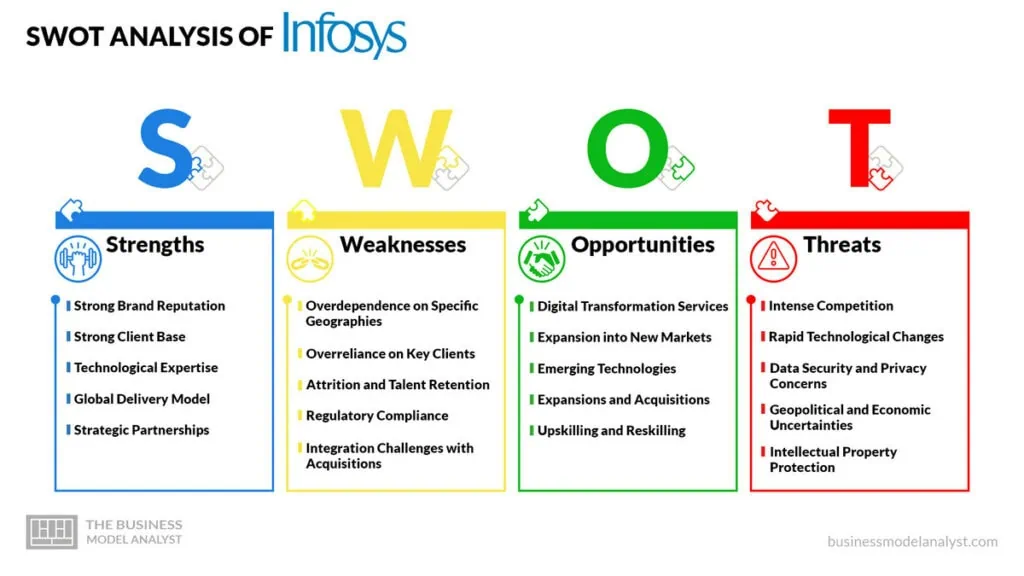The Infosys SWOT Analysis consists of all the strengths, weaknesses, opportunities, and threats that the Indian multinational information technology company is facing. This is essential to gain a comprehensive understanding and provide a robust examination of Infosys’ internal and external factors, shedding light on the key elements that contribute to its dominance in the market and its potential for future growth and adaptation.
Infosys Limited is an Indian multinational information technology company that provides business consulting, information technology, and outsourcing services. Infosys has carved a formidable niche for itself in the industry, delivering cutting-edge technology solutions to clients across the globe.
The company offers a wide range of services, including software development, maintenance and support, system integration, cloud services, cybersecurity, data analytics, artificial intelligence, and digital transformation solutions. Infosys’ expertise lies in helping organizations leverage technology to enhance their operational efficiency, improve customer experience, and drive innovation.
Headquartered in Bangalore, India, Infosys operates in more than 40 countries and serves clients in various industries, including finance, healthcare, retail, and manufacturing. Infosys places great emphasis on research and development, investing in cutting-edge technologies, and fostering a culture of innovation.
It has also been recognized for its commitment to sustainability, diversity, and social responsibility, actively contributing to the communities it operates in. As a prominent player in the IT industry, Infosys has consistently ranked among the top companies in terms of revenue and market capitalization.
Infosys was founded on the 2nd of July 1981, in Pune, India, by a group of seven entrepreneurs led by Narayana Murthy, Nandan Nilekani, and S. Gopalakrishnan. The company was founded with the vision of harnessing the power of technology and leveraging it to transform businesses worldwide. With a meager initial capital of $150, the company embarked on its journey to provide software development and maintenance services to clients around the world.
The initial years were challenging, as a result of limited resources and intense competition. However, Infosys quickly distinguished itself by adopting a customer-centric approach and delivering quality software solutions that exceeded client expectations. Its commitment to innovation and focus on providing value to clients set the foundation for its future success.
By the early 1990s, Infosys had become a prominent player in the Indian IT industry, establishing a reputation for its technical expertise and commitment to ethical business practices. The company went public in 1993, with its initial public offering (IPO) oversubscribed more than 100 times, signaling investor confidence in its growth potential. In the same 1993, Infosys became the first Indian company to be listed on the NASDAQ.
This marked a significant milestone in its history. This move not only provided the company with access to international capital markets, but also bolstered its credibility and visibility on the global stage. The successful listing demonstrated Infosys’ commitment to transparency, corporate governance, and its ability to compete with established multinational IT companies.
As Infosys gained momentum, it recognized the need to diversify its business offerings and expand its global footprint. In the late 1990s, the company started venturing into new domains, including consulting, systems integration, business process outsourcing (BPO) services, and package implementation. This strategic shift allowed Infosys to offer end-to-end solutions to its clients, strengthening its position as a comprehensive IT services provider.
In the early 2000s, the company made significant strides in international markets, establishing development centers and offices across the United States, Europe, and Asia-Pacific. This global expansion enabled the company to serve a broader clientele and tap into new business opportunities, cementing its position as a global IT powerhouse.
Recognizing the potential for growth beyond traditional IT services, Infosys began diversifying its portfolio by entering various industry verticals. It created specialized business units and subsidiaries to cater to specific sectors and leverage its expertise in delivering tailored solutions. One notable subsidiary is EdgeVerve Systems, which focuses on providing software products and platforms to banking, financial services, and insurance sectors.
Another subsidiary, Infosys BPM (Business Process Management), offers end-to-end business process management and outsourcing services, enabling clients to streamline their operations and improve efficiency.
Additionally, Infosys ventured into consulting services through Infosys Consulting Inc., delivering strategic advice and transformational solutions to help clients navigate complex business challenges and drive growth. The company also established the Infosys Foundation, a philanthropic arm dedicated to social development initiatives, education, healthcare, and rural empowerment.
As the IT landscape continues to evolve, Infosys has embraced digital transformation and emerging technologies to stay ahead of the curve. The company has invested heavily in areas such as artificial intelligence, machine learning, blockchain, cloud computing, and data analytics.
By leveraging these technologies, Infosys empowers its clients to navigate the digital era, unlock new opportunities, and drive innovation. In this article, we will provide a robust examination of Infosys’ internal and external factors in its SWOT analysis, shedding light on the key elements that contribute to its dominance in the market and its potential for future growth and adaptation.
Contents
Infosys Strengths
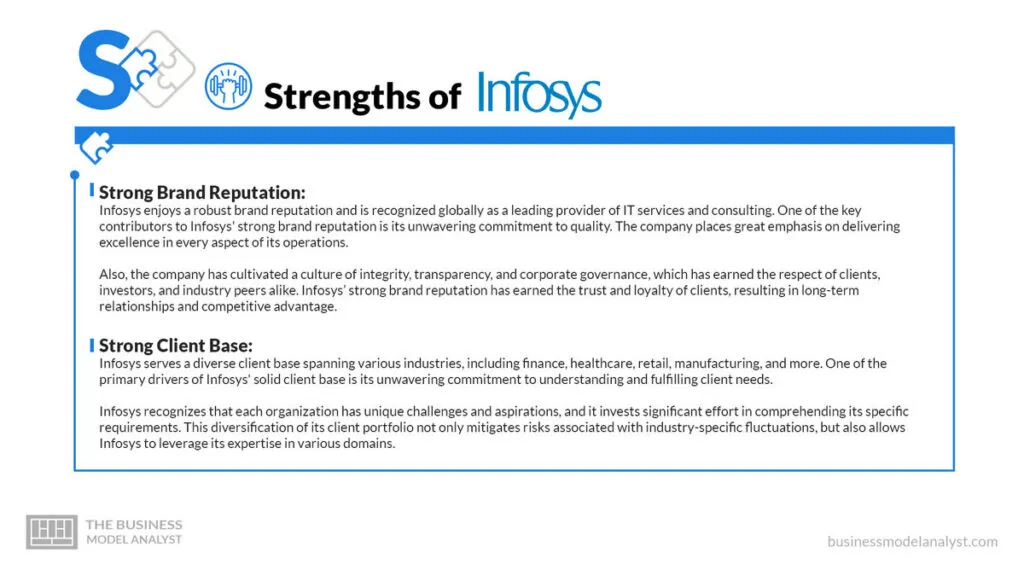
The following are the strengths of Infosys:
- Strong Brand Reputation
Infosys enjoys a robust brand reputation and is recognized globally as a leading provider of IT services and consulting. One of the key contributors to Infosys’ strong brand reputation is its unwavering commitment to quality. The company places great emphasis on delivering excellence in every aspect of its operations.
Also, the company has cultivated a culture of integrity, transparency, and corporate governance, which has earned the respect of clients, investors, and industry peers alike. Infosys’ strong brand reputation has earned the trust and loyalty of clients, resulting in long-term relationships and competitive advantage.
- Strong Client Base
Infosys serves a diverse client base spanning various industries, including finance, healthcare, retail, manufacturing, and more. One of the primary drivers of Infosys’ solid client base is its unwavering commitment to understanding and fulfilling client needs.
Infosys recognizes that each organization has unique challenges and aspirations, and it invests significant effort in comprehending its specific requirements. This diversification of its client portfolio not only mitigates risks associated with industry-specific fluctuations, but also allows Infosys to leverage its expertise in various domains.
- Technological Expertise
Infosys possesses deep technical expertise across a wide range of domains, including software development, cloud computing, data analytics, artificial intelligence, and cybersecurity. One of the key factors behind Infosys’ technological expertise lies in its talented and skilled workforce.
The company has assembled a team of experienced professionals who possess a comprehensive understanding of diverse domains. Also, Infosys’ technological expertise is not limited to theoretical knowledge.
The company has a proven track record of successfully implementing large-scale IT projects across various industries. By combining technical expertise with industry knowledge, Infosys can deliver customized solutions that address specific pain points and drive meaningful business outcomes.
- Global Delivery Model
The Global Delivery Model of Infosys encompasses a range of delivery options, including onsite, offsite, nearshore, and offshore delivery. It is built upon a strong foundation of global presence and local expertise.
With operations in over 46 countries and delivery centers strategically located around the world, Infosys has established a vast network that enables it to tap into local talent pools, gain insights into regional markets, and effectively meet the diverse needs of its clients.
One of the key benefits of Infosys’ Global Delivery Model is its ability to leverage local talent and expertise. By establishing delivery centers in different countries, Infosys can tap into a diverse pool of skilled professionals who possess in-depth knowledge of local markets, regulations, and cultural nuances.
- Strategic Partnerships
Strategic partnerships lie at the heart of Infosys’ approach to fostering innovation and expanding its service offerings. The company actively seeks collaborations with leading technology providers, industry-specific experts, academic institutions, and research organizations.
By joining forces with these entities, Infosys gains access to cutting-edge technologies, emerging trends, and industry insights that help shape its strategic direction and enhance its capabilities.
Also, strategic partnerships open doors to new business opportunities and markets for Infosys. Collaborations with industry leaders, such as Google, Amazon, IBM, etc., provide access to their extensive client networks, allowing Infosys to expand its reach and penetrate new sectors.
Infosys Weaknesses
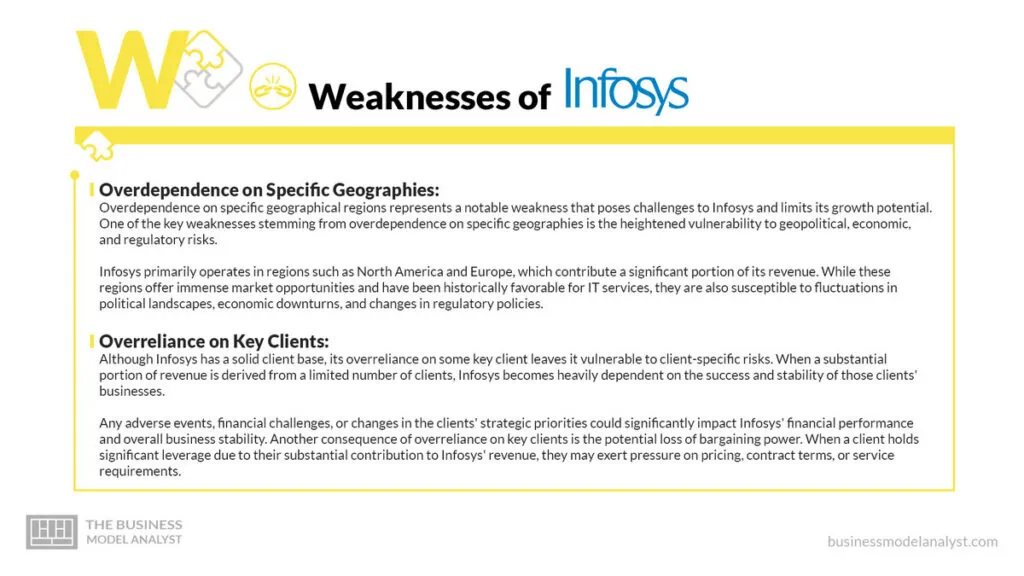
The following are the weaknesses of Infosys’ business model:
- Overdependence on Specific Geographies
Overdependence on specific geographical regions represents a notable weakness that poses challenges to Infosys and limits its growth potential. One of the key weaknesses stemming from overdependence on specific geographies is the heightened vulnerability to geopolitical, economic, and regulatory risks.
Infosys primarily operates in regions such as North America and Europe, which contribute a significant portion of its revenue. While these regions offer immense market opportunities and have been historically favorable for IT services, they are also susceptible to fluctuations in political landscapes, economic downturns, and changes in regulatory policies.
- Overreliance on Key Clients
Although Infosys has a solid client base, its overreliance on some key client leaves it vulnerable to client-specific risks. When a substantial portion of revenue is derived from a limited number of clients, Infosys becomes heavily dependent on the success and stability of those clients’ businesses.
Any adverse events, financial challenges, or changes in the clients’ strategic priorities could significantly impact Infosys’ financial performance and overall business stability. Another consequence of overreliance on key clients is the potential loss of bargaining power. When a client holds significant leverage due to their substantial contribution to Infosys’ revenue, they may exert pressure on pricing, contract terms, or service requirements.
- Attrition and Talent Retention
In the fiercely competitive landscape of the IT services and consulting industry, attracting and retaining top talent is crucial for sustained growth, innovation, and client satisfaction. However, attrition, or the rate at which employees leave a company, is a pressing concern for Infosys.
The highly skilled and specialized nature of the IT industry means that talented professionals are constantly sought after by competitors, both within the industry and beyond. This intense competition for talent creates a risk for Infosys, as the loss of skilled employees can lead to knowledge gaps, project disruptions, and increased costs associated with recruitment and training.
- Regulatory Compliance
One of the primary challenges for Infosys regarding regulatory compliance is the complexity and diversity of regulations across different geographies. As a multinational corporation operating in various countries, Infosys must navigate a multitude of legal frameworks, industry-specific regulations, data protection requirements, and labor laws.
Adhering to these regulations while ensuring consistency across different regions can be a daunting task. Failure to comply with relevant regulations can result in legal consequences, financial penalties, and damage to the company’s reputation. Additionally, as technology plays a vital role in Infosys’ operations, compliance with data protection and privacy regulations becomes crucial.
- Integration Challenges with Acquisitions
The primary integration challenge faced by Infosys relates to cultural alignment. Each company has its own unique culture, values, and ways of doing business. When Infosys acquires a new organization, the clash of cultures can create friction and impede the smooth integration of operations.
Differences in work styles, decision-making processes, communication norms, and organizational hierarchies can pose challenges in aligning the acquired company with Infosys’ established practices and values.
Failure to effectively address cultural integration can result in employee dissatisfaction, decreased productivity, and even talent attrition, diminishing the potential benefits of the acquisition.
Infosys Opportunities
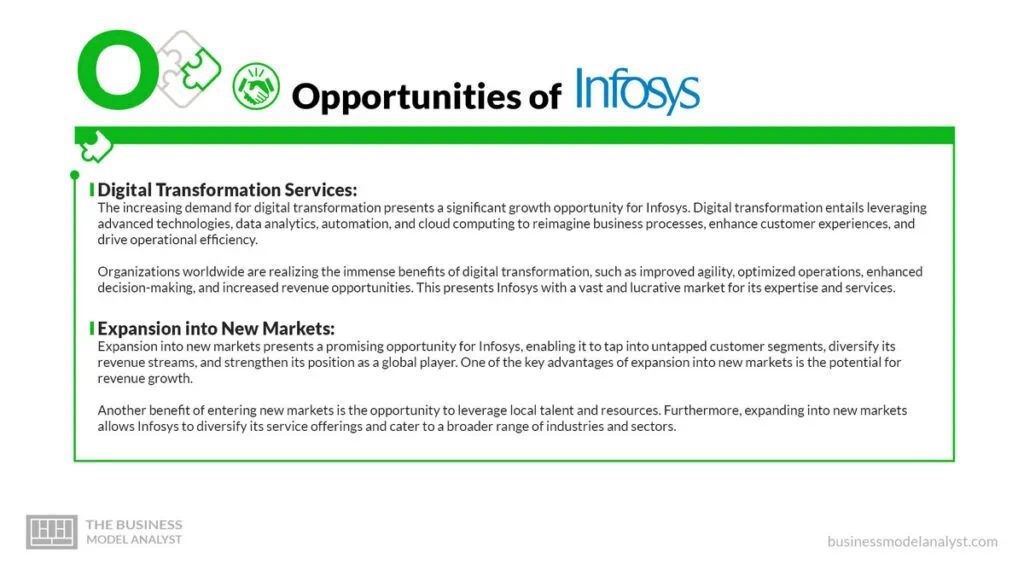
The following are the opportunities available for Infosys in the IT industry:
- Digital Transformation Services
The increasing demand for digital transformation presents a significant growth opportunity for Infosys. Digital transformation entails leveraging advanced technologies, data analytics, automation, and cloud computing to reimagine business processes, enhance customer experiences, and drive operational efficiency.
Organizations worldwide are realizing the immense benefits of digital transformation, such as improved agility, optimized operations, enhanced decision-making, and increased revenue opportunities. This presents Infosys with a vast and lucrative market for its expertise and services.
- Expansion into New Markets
Expansion into new markets presents a promising opportunity for Infosys, enabling it to tap into untapped customer segments, diversify its revenue streams, and strengthen its position as a global player. One of the key advantages of expansion into new markets is the potential for revenue growth.
Another benefit of entering new markets is the opportunity to leverage local talent and resources. Furthermore, expanding into new markets allows Infosys to diversify its service offerings and cater to a broader range of industries and sectors.
- Emerging Technologies
The advent of technologies such as artificial intelligence (AI), machine learning, blockchain, Internet of Things (IoT), and augmented reality (AR) has unlocked immense potential for organizations across various sectors. These technologies offer new ways to optimize processes, improve customer experiences, enable data-driven decision-making, and unlock new revenue streams.
Infosys, with its technological expertise and industry knowledge, is well-positioned to leverage these emerging technologies and provide cutting-edge solutions to its clients. By investing in research and development and forging strategic partnerships, Infosys can capitalize on the potential of these technologies to create new revenue streams.
- Expansions and Acquisitions
One of the key advantages of expansions and acquisitions is the ability to quickly enter new markets and expand the customer base. Infosys can leverage its strong financial position and global brand recognition to identify strategic opportunities for geographic expansion.
By establishing a physical presence in new regions, Infosys can tap into local markets, forge relationships with local businesses, and gain a deep understanding of the specific needs and dynamics of those markets.
This enables Infosys to tailor its services, build trust with local clients, and unlock new revenue streams. Through these methods, Infosys can drive innovation, create value for its clients, and achieve sustainable long-term success.
- Upskilling and Reskilling
As disruptive technologies such as artificial intelligence (AI), machine learning, blockchain, and cloud computing reshape industries, organizations must ensure that their workforce possesses the necessary skills to leverage these advancements. Infosys can seize this opportunity by investing in comprehensive upskilling and reskilling programs that equip its employees with the knowledge and competencies needed to thrive in the digital era.
By upskilling its workforce, Infosys can build a talent pool proficient in cutting-edge technologies and industry best practices. Reskilling, on the other hand, offers the opportunity to pivot employee skill sets to align with emerging business requirements.
Infosys Threat
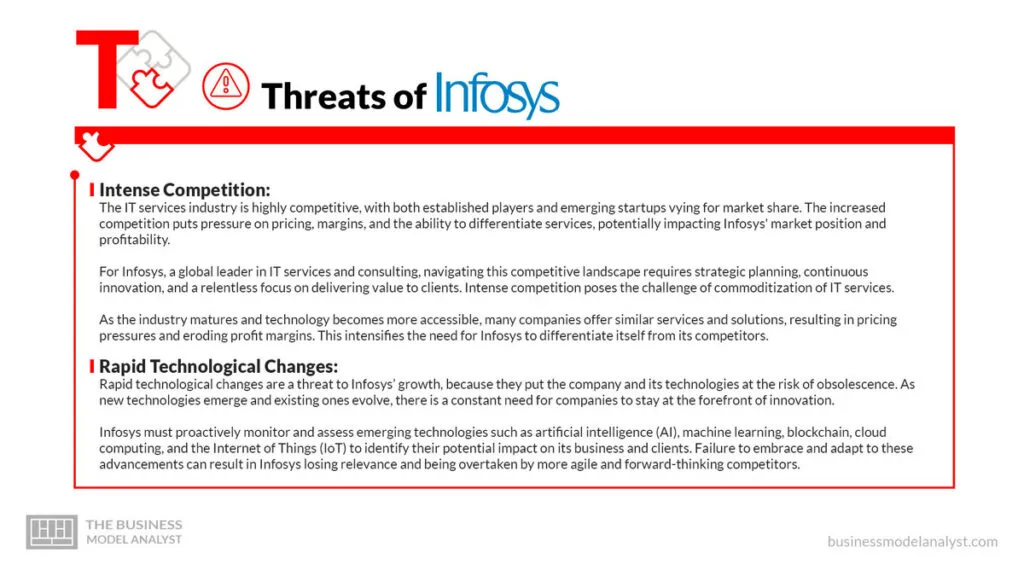
The following are the factors that threaten Infosys’ domination in the IT industry:
- Intense Competition
The IT services industry is highly competitive, with both established players and emerging startups vying for market share. The increased competition puts pressure on pricing, margins, and the ability to differentiate services, potentially impacting Infosys’ market position and profitability.
For Infosys, a global leader in IT services and consulting, navigating this competitive landscape requires strategic planning, continuous innovation, and a relentless focus on delivering value to clients. Intense competition poses the challenge of commoditization of IT services.
As the industry matures and technology becomes more accessible, many companies offer similar services and solutions, resulting in pricing pressures and eroding profit margins. This intensifies the need for Infosys to differentiate itself from its competitors.
- Rapid Technological Changes
Rapid technological changes are a threat to Infosys’ growth, because they put the company and its technologies at the risk of obsolescence. As new technologies emerge and existing ones evolve, there is a constant need for companies to stay at the forefront of innovation.
Infosys must proactively monitor and assess emerging technologies such as artificial intelligence (AI), machine learning, blockchain, cloud computing, and the Internet of Things (IoT) to identify their potential impact on its business and clients. Failure to embrace and adapt to these advancements can result in Infosys losing relevance and being overtaken by more agile and forward-thinking competitors.
- Data Security and Privacy Concerns
With the rapid advancement of technology, there is an increased risk of data breaches and cyberattacks. The proliferation of sophisticated hacking techniques and the growing value of data encourages malicious actors to exploit vulnerabilities, and this poses a severe threat to Infosys’ credibility and profitability.
Infosys must remain vigilant and invest in state-of-the-art cybersecurity measures to protect its clients’ sensitive information and intellectual property. This includes implementing robust firewalls, intrusion detection systems, and encryption protocols, and regularly conducting vulnerability assessments and penetration tests.
Furthermore, Infosys must stay updated with evolving regulations, adapt its policies and practices accordingly, and implement necessary measures to safeguard data privacy.
- Geopolitical and Economic Uncertainties
Geopolitical uncertainties have the potential to disrupt international trade and cross-border operations. Factors such as trade wars, protectionist policies, political instability, and diplomatic tensions can create barriers to conducting business smoothly across different countries and regions.
Infosys, with its global footprint and diverse client base, must closely monitor geopolitical developments and assess their potential impact on its operations. By diversifying its geographical presence and maintaining a robust network of delivery centers, Infosys can mitigate risks associated with geopolitical uncertainties.
Also, economic uncertainties, such as recessions, currency fluctuations, and policy changes, can significantly impact business environments.
- Intellectual Property Protection
Inadequate IP protection puts Infosys at risk of unauthorized use or replication of the company’s proprietary technologies, software solutions, and innovative methodologies, by others. Infosys invests significant time, effort, and resources in developing cutting-edge technologies and processes that provide a competitive edge in the market.
Protecting these valuable assets from unauthorized access and misuse is crucial to preserving Infosys’ uniqueness and value proposition. Infosys must implement strict access controls, trade secret protection measures, and non-disclosure agreements to safeguard its intellectual property from internal and external threats. Failure to adequately manage IP risks can lead to legal battles, reputational damage, and restrictions on product development and innovation
Conclusion
Infosys’ strong brand reputation, extensive global presence, and robust delivery capabilities position it as a leader in the IT services and consulting industry. The company’s ability to leverage emerging technologies, foster innovation, and adapt to changing customer demands provides a solid foundation for future growth.
However, it must also address the challenges of intense competition, rapid technological changes, data security and privacy concerns, geopolitical and economic uncertainties, and intellectual property protection.
By capitalizing on its strengths, seizing opportunities, and proactively addressing these threats, Infosys can navigate the dynamic business landscape, maintain its competitive edge, and continue delivering value to its clients and stakeholders.


